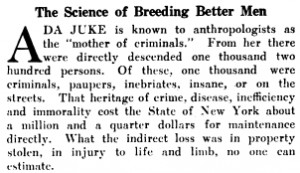Alexis Carrel, Nobel Prize Winner. Man the Unknown, 1939. [Source] A choice must be made among the multitude of civilized human beings. We have mentioned that natural selection has not played its part for a long while. That many inferior individuals have been conserved through the efforts of hygiene and medicine. But we cannot prevent …
Category: Fit and Unfit
Foster Kennedy: Euthanasia for “Nature’s Mistakes” up to the age of 5
Kennedy’s address at the 97th annual meeting of the American Psychiatric Association in 1941 encapsulates well how the acceptance of evolution and utilitarian thinking are tied into arguments for eugenics (and euthanasia), which is ironic, of course, since many advocates for euthanasia deny such connections and modern proponents of evolution become apoplectic at the insinuation …
Eugenics as a Religion and Social Darwinism, Collin Wells
Source: Dr. Collin Wells, “Social Darwinism” a paper presented in 1907, found in The American Journal of Sociology, pages 706-709 Finally, what is the evolutionary value of certain ideals? Let us take individualism, the ideal of democracy, which has tacitly figured in many of the phenomena to which I have already referred. Let us go …
Objections to Compulsory Sterilization “are essentially sentimental.”
While eugenics today is castigated as ‘pseudoscience,’ the eugenicists themselves might say that the chief difference between progressives then versus now, is the latter is hindered by ‘sentimentality.’ E.A. Ross, Letter to Charles McCarthy, January 30, 1907. (As found in Rudolph J. Vecoli’s “Sterilization: A Progressive Measure” in Wisconsin Magazine of History, Spring 1960. LINK: wisconsin-sterilization-progressives-21585 …
Scientific American: “The Science of Breeding Better Men” 1911
Editorial from a 1911 edition of Scientific American [Source]: Sci-Am’s Editor’s note: This editorial was written and published in 1911. Although our editors of a century ago pondered some lofty aspirations for the orderly future of humans, it was only three decades later that the brutal reality of a Nazi social order suffused with a …
Sydney Webb: The parasites should not be allowed to compete as wage-earners, for it prevents natural selection from working…
Sydney Webb in Industrial Democracy (regarding the minimum wage) – 1920 The problem of the Unemployable is not created by the fixing of a National Minimum by law. The Unemployable we have always with us. With regards to certain sections of the population, this unemployment is not a mark of social disease, but of social …
Excerpt: Darwin’s Dilemma as told by Bertrand Russell, from Designing Babies
From Designing Babies: The Brave New World of Reproductive Technology by Roger Gosden. W.H. Freeman and Company, New York. 1999. Page 3-4 According to Darwin’s theory, natural selection decides which individuals are fit to survive and breed. So powerful was this idea that it quickly engaged not only fellow biologists but also intellectuals who were …
Eugenics Quote of the Day: Birth Control is about Weeding out the Unfit; so says Margaret Sanger
“Birth control itself … is nothing more or less than the facilitation of the process of weeding out the unfit, of preventing the birth of defectives or of those who will become defectives.” So says MARGARET SANGER.
Separating Sex from Reproduction, the School, and the State
“The family is already being eroded by the intervention of school and state, and [the separation of sex from reproduction] might be its coup de grace.” G. Taylor, 1968
On the Elimination of Defectives: Hitler, in Mein Kampf
Note the utilitarian appeal to the reduction of suffering, the appeal to the ‘common good’, and the basic belief that all he is doing is applying biological principles. Hitler, in Mein Kampf. [Source] In this field the People’s State will have to repair the damage that arises from the fact that the problem is at …


Recent Comments